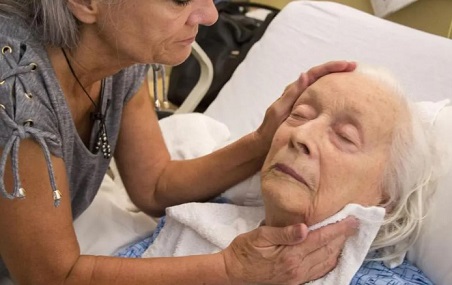Canadian Scientists Warn That Those With Existing Neurological Conditions Have Higher Risk Of Dying Upon Infection With SARS-CoV-2
Nikhil Prasad Fact checked by:Thailand Medical News Team May 14, 2024 11 months, 1 week, 4 days, 23 hours, 2 minutes ago
COVID-19 News: The COVID-19 pandemic has profoundly impacted global health, revealing various vulnerabilities within different population groups. Recent research from the University of Alberta highlights a significant concern: individuals with pre-existing neurological conditions face a heightened risk of mortality and are more likely to develop new neurological disorders if they contract COVID-19. This
COVID-19 News report delves into the study's findings, the implications for healthcare, and the necessity for heightened awareness and preventive measures among vulnerable populations.
 Canadian Scientists Warn That Those With Existing Neurological
Canadian Scientists Warn That Those With Existing Neurological
Conditions Have Higher Risk Of Dying Upon Infection With SARS-CoV-2
Overview of the Research
A team of researchers from the University of Alberta’s Long COVID Clinic including Candace Marsters, Grace Lam, Christopher Power, Jeffrey Bakal, and Finlay McAlister, conducted an extensive study to explore the relationship between pre-existing neurological conditions and COVID-19 outcomes. Utilizing a comprehensive dataset comprising 350,000 Alberta patients who tested positive for COVID-19 during the first year of the pandemic, the study compared symptoms and outcomes in both the acute (up to three months) and post-acute (three to nine months) phases of the illness.
Key Findings
The study, published in the journal Brain, uncovered several critical insights especially the issue of increased mortality risk.
It was found that individuals with existing neurological conditions such as Parkinson’s disease, dementia, seizure disorders, encephalopathy, and a history of stroke faced a significantly higher risk of death after contracting COVID-19. The mortality rate among COVID-19 positive patients was substantially higher than that of their COVID-negative counterparts.
Development of New Neurological Disorders
The research confirmed a higher incidence of new neurological disorders following a COVID-19 infection. Conditions such as encephalopathy, dementia, seizures, brain fog, and myelitis were more frequently diagnosed within three months of a positive COVID-19 test. The risk persisted into the post-acute phase, with an increased incidence of inflammatory myopathy and coma.
Impact on Healthcare
The findings underscore the ongoing burden of COVID-19 on healthcare systems, particularly in managing long-term neurological complications. The establishment of the Long COVID Clinic at the University of Alberta in June 2021 highlights the need for specialized care for patients with persistent symptoms.
Long COVID and Persistent Symptoms
The University of Alberta’s Long COVID Clinic has provided valuable insights into the prolonged effects of the virus on neurological health. Many patients report persistent neurological symptoms, including loss
of smell and taste, nerve pain, weakness, insomnia, and cognitive dysfunction. These symptoms significantly impact daily functioning, often preventing individuals from returning to work or managing routine activities.
Dr Maeve Smith, co-director of the clinic, notes the profound impact on patients' quality of life, emphasizing the need for ongoing support and tailored treatment strategies to address these chronic issues.
Pre-existing Conditions and COVID-19 Outcomes
The increased susceptibility and adverse outcomes for individuals with pre-existing neurological conditions align with findings from other studies worldwide. The research suggests that neurological disorders may exacerbate the severity of COVID-19, potentially due to the underlying vulnerabilities in the brain and nervous system.
Mechanisms of Neurological Impact
The exact mechanisms through which COVID-19 exacerbates neurological conditions or leads to new neurological disorders remain a subject of ongoing research. Hypotheses include direct viral invasion of the nervous system, immune-mediated damage, and the impact of systemic inflammation.
Understanding these mechanisms is crucial for developing targeted therapies and preventive measures.
Recommendations and Future Directions
-Heightened Awareness and Medical Follow-up
The study's authors advocate for heightened awareness among healthcare providers and patients regarding the risks of neurological complications following a COVID-19 infection. Continuous medical follow-up is essential to identify and manage new or worsening neurological symptoms promptly.
-Enhancing Healthcare Support
Healthcare systems must adapt to address the increased burden of long-term neurological complications. This includes expanding resources for specialized clinics like the Long COVID Clinic and training healthcare professionals to recognize and treat these complex conditions effectively.
Continued Research and Public Health Strategies
Ongoing research is vital to uncover the long-term effects of COVID-19 on neurological health. Public health strategies should incorporate these findings to protect vulnerable populations, emphasizing the importance of vaccination, early intervention, and comprehensive care for those with pre-existing neurological conditions.
Conclusion
The University of Alberta's study sheds light on the significant risks faced by individuals with neurological conditions during the COVID-19 pandemic. The increased mortality rate and higher incidence of new neurological disorders underscore the need for targeted preventive measures, vigilant monitoring, and specialized healthcare support. As the world continues to navigate the challenges posed by COVID-19, understanding and addressing the specific vulnerabilities of at-risk populations remains a critical priority for public health and medical communities.
The study findings were published in the peer reviewed journal: Brain.
https://academic.oup.com/brain/advance-article-abstract/doi/10.1093/brain/awae117/7654052
For the latest
COVID-19 News, keep on logging to Thailand Medical News.
